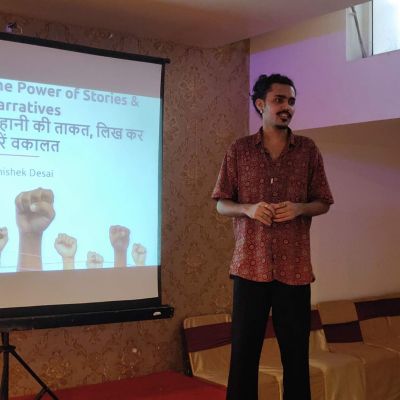relationships
Our body is home. We exercise, we eat right. We adorn it with jewels and tattoos. We live well and breathe easier if our home (our body) is clean, fed and rested. Come home to yourself. Masturbation is one of the easiest ways home.
It could be your best friend, a partner, a sister or a parent. Hurting and getting hurt seem to form the basic universal nature of relationships. I have always wondered about why we like creating these connections, and why we need this social network.
Last weekend, after a very hectic week, I was looking for a light and easy movie to watch and came…
But whether you root for this couple or not, Little Things makes you think about the small things – like reading out a line from a book of poetry, sharing a friend’s WhatsApp message with your partner, forgetting to wash your dirty socks before they make the room stink – that make or break a relationship.
My friend’s son, too, likes wearing tutus and frilly skirts. Every time they go shopping for clothes, he heads to the girl’s section and picks out the frilliest outfit. At check out, invariably the cashier asks if the pretty outfit is for his sister and he confidently says it is for him. Often he wears these outfits to school. His confidence comes from his mother’s acceptance of him and her understanding of his gender expansiveness. It helps that she is a sociologist, but there is a constant pushback from society including from his peers at school who bully the little boy. But it is the constant support from his mother and family that allows him to remain confident and thrive whilst being different.
It was very interesting to read Sexless in the City (For No Fault of Mine) by Malini Chib and the…
Often when we speak of families and family history, we talk genetics, traditions and inheritance of all kinds. Somehow our relationship by blood or otherwise to a clan is supposed to help us identify our place in the universe. So there’s family medical history, family culture, family traditions of food and career. But sexuality? A family history that focuses on sexuality? What would that even mean?
As we move toward destigmatising the topic of sex for all genders, we should include the language of intimacy as we collectively create a new cultural grammar around sex.
Emma Watson spoke to British Vogue about the incredible amounts of stress and anxiety that follows, “…if you have not built a home, if you do not have a husband, if you do not have a baby, and you are turning 30, and you’re not in some incredibly secure, stable place in your career, or you’re still figuring things out…”
Both rejections and affirmations of the couple are skewered on this doubleness: It is the fullest expression of love and proximity available to us, and it bears all the insufficiencies of present social relations. Monogamous romantic commitment, like infallible lifelong attraction to only men or only women, is surely a minority tendency expediently elevated to a general social principle.
Sexuality makes me think of an erotic adventure. Something that helps us be alive to the world around us, and to life around us.
Sexuality is fluid, embodying my emotions, and their expression, thereby creating an aspect of my identity central to me.
The pandemic and lockdown isolation made recovery harder for people with sex or porn addiction because of a lack of support systems that enabled their recovery.
The lovers enact many recognizable hetero-normative romantic tropes – the wronged petulant woman pacified via kisses and caresses, the woman too tired for sex who then tries to placate the sulking male lover.
What does belonging, then, look like in urban India for people from different social, economic and political backgrounds?















